
Aging porn stars….too funny.
Spy Agencies Are Like Old-School Porn — But That's Changing
By Jennifer Peters at VICE.com
EXTRACT
The traditional intelligence agencies are a lot like the old-school porn industry: they're still trying to make and sell porn like it's 1979, even though a lot of what they're selling is just hanging out online, free for anyone to download at their leisure. To stay relevant, they need to stop wasting money on producing material they or their customers can get for free and develop new ways to find, collect, and curate that sexy, sexy free intelligence information.
Robert Steele's complete answers (13 pages) below the fold.

ROBERT STEELE: Ms. Peters has gotten a good start on a new look at a twenty-five year fight between those of us who believe intelligence should focus on decision-support, and those who are simply going along with business as usual, the obligation of vast amounts of money with very little public benefit. The bland assurances from the secret agencies, including DIA, are simply not credible — my own indictment of defense intelligence remains quite clear. Below are the answers I gave to Ms. Peters when she interviewed me via email for this article. I happen to generally like and admire the existing leaders of the secret world but if they want to get it right and be useful, they are going to have to break with the prevailing paradigm of spending money for the sake of spending money, and actually start thinking about the minutia of military, civil, and natural factors for planning and programming for expeditionary operations in the Third World, against four distinct forces: high-tech brutes, low-tech brutes, high-tech seers, and low-tech seers — and they must rise to the challenge of integrating holistic analytics, true cost economics, and open source everything engineering in support of Whole of Government intelligence — decision-support for the President AND everyone else. None of this is new. I helped led 25 Marine Corps uniformed and civilian personnel and then 750 speakers and 7500 practitioners in pioneering most of it beginning in 1988. This is an idea whose time has come.
See Also:
The open source revolution is coming and it will conquer the 1% – ex CIA spy
OSINT Literature Review, Name Association, Lessons Learned
Here as a 15 page document: Steele on OSINT for VICE 1.4, below in full text for ease of translation.
Q: The NGA's recent announcement that they plan to utilize more open-source information, as well as their release of Hootenanny (open-source map software) signals a commitment to and reliance on open-source information. What do you make of their recent move? Is this something that's been a long time coming, or is this a sudden shift for them?
A: NGA is on the right track but in the context of my 25 year fight for open source everything, can hardly be considered to be much beyond the second or third grade in relation to where they need to be. Open source data and open source software are two of roughly sixty opens in nine major open source sub-categories. Below is an illustration of a larger open source ecology not yet grasped by NGA or any element of the US Government.
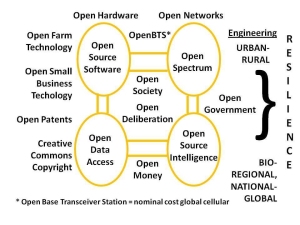
Absent an equal commitment to open cloud, open hardware, open spectrum, and open standards, to name just four of the other essential opens, I expect NGA to be going through the motions and not making a great deal of headway in the next five years. Geospatial data is now vastly more than just maps – I was the person, in 1988, who sounded the alarm, along with Col Mike Pheneger, USA, then the J-2 of the US Special Operations Command, on the fact that NGA’s predecessor was unable to produce tactical military amps for 90% of the world. Nothing has changed. We are still using Russian military maps in Somalia, for example. NGA’s greatest problem is that it is dependent on the National Reconnaissance Office (NRO) for “feeds & speeds” and it is unable to break away from the secret world and morph into an Open Source Agency (OSA) able to not only provide a geospatial foundation for all data in relation, but also be the champion for acquiring and making sense of all information in all mediums and languages, something I wrote an entire book about (INFORMATION OPERATIONS: All Information, All Languages, All the Time).
CrisisMappers is a useful counter-point to NGA. CrisisMappers is now the standard United Nations emergency response geospatial application. It is also the only one that integrates open data, open software, humans trained in advance, a complete leveraging of the local cellular systems to receive Instagram and SMS reports, and also a complete leveraging of the diaspora of each country so as to obtain translations on the fly of each SMS message from Creole, Tagalog, or whatever. I believe the time has come for NGA to merge with the US Geological Survey, a recommendation made by the National Academy of Public Administration (NAPA) in a study carried out by my friend Arnold Donahue. The time has also come for the President and Secretary of State to sponsor the OSA that has been asked for by enlightened intelligence professionals since the 1960’s. I am inclined to keep the two separate, but to make the NGA the portal for delivering integrated open source information from the OSA into the secret world.
Q: A big change we see is a greater need for intelligence agencies to rely on open-source, when that hasn't always been the main source of data/information. With so much data now available, it seems like it would take much more effort, in terms of analysis, to cull only the most useful information to be “synthesized” into intelligence. Is this the case? Does having all of this data out there make the job harder?
A: Open source information has ALWAYS been the main source of data/information. This has been said in writing and publicly by Allen Dulles, William Colby, and myself, among others. The PROBLEM is that open source information is not expensive, not secret, and not in English, which means that it is less profitable to the military-industrial-intelligence complex, and also more of a challenge – most US citizens who qualify for top secret clearances do not speak foreign languages with sufficient competence. I would also stress that Open Source Intelligence (OSINT) is a HUMAN discipline, not a technical discipline. The billion or more dollars that DoD and the IC are spending now on open source machine processing is as wasteful as the tens of billions being spent on mass surveillance by NSA – unproductive in the extreme.
My ideas from the 1980’s were hijacked and corrupted. The way you handle vast amounts of information in multiple mediums, languages, and locations is by creating human networks of Subject Matter Experts (SME) combined with indigenous observers, and by executing my original vision, of knowing who knows and being able to reach out and pull in “just enough just in time” tailored information. The primary problems of the secret world are that it has a business model that demands very expensive projects, contractor execution instead of internal execution, top secret clearances for everyone, convoluted bureaucratic approval processes, and in the end, zero accountability. As I have written across many books, but particularly in my CounterPunch article, “Intelligence for the President – AND Everyone Else,” not only can open sources answer 90% or more of our questions, but they can provide ethical evidence-based decision-support for Whole of Government, which is to say, from Agriculture to Energy to Health to Justice to Water and beyond.
The secret world refuses to be serious about providing intelligence – decision-support to Whole of Government. It refuses to respect the fact that decision-support which is open and can be shared with the media, Congress, and the public is vastly more useful to the community than isolated secrets of questionable value. I would also point out – see my original chapter on “Open Source Intelligence” from Loch Johnson’s five-volume series on intelligence – that open source is the only integrative discipline that allows everyone to see intelligence about all the threats, all the policies, all the demographics, all the true costs, in one fell swoop. Its contextual value is PRICELESS. My latest work on how open sources are a higher form of intelligence has been published as “The Evolving Craft of Intelligence” in Rob Dover et al, the core graphic is below.
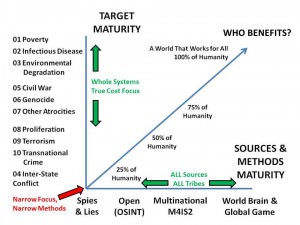
It is vital that your readers understand that we have a secret intelligence world that costs roughly $100 billion a year while failing to protect us from any major threat including domestic terrorism – NSA’s mass surveillance has not stopped a single terrorist incident at the same time that the FBI has been documented as funding 175 alleged terrorist cells so that it could make arrests – and the secret world is worthless in relation to national strategy, national policy, national acquisition, or national operations. This is a secret world whose one unclassified project of note, Global Trends 2030, recommended fracking as part of our national energy solution. Idiocy of this sort needs to be eradicated, the way to do that is to have a proper national Open Source Agency that sets the gold standard for what can be known using legal ethical open sources of information, holding the secret world accountable for common sense. 50% of the US Government is waste – 50% of every major US industry from agriculture to energy to health to the military to water management is waste. We have lost the ability to govern ourselves.
Q: Another big change is that technology has allowed for things that would have been top-secret only a few decades ago to be made public. Something like Google Maps, or Bellingcat, would have been considered state secrets during the Cold War. Now, anyone can access these maps and images, and can use them to do their own analysis. Do you think that having this information so widely available is a good thing? What impact does this have on the intelligence community?
A: This is not quite right. You have to understand that Google is an extension of the NSA, not a separate private enterprise, and what Google does is a continuation of secret world pathologies – focusing on collection instead of analysis, for example. If you look at the many negative appreciations of “Big Data” at Phi Beta Iota the Public Intelligence Blog, you quickly see that Google, Goldman Sachs – all the major banks, corporations, and other organizations – are processing less than 1% of what they collect. Technology has been used as a substitute for thinking in both the secret world and the corporate world. Human Intelligence (HUMINT) has been marginalized, to the point that our national policy conversations about Iran, China, ISIS, whatever, are dominated by ideological, financial, or religious traitors spouting insanely false information without being challenged by the media, including the progressive media – Rolling Stone, Slate, and TruthOut, to name just three, have been extremely disappointing to me. Below is a chart from my recent foreword to a book on CyberOSINT, showing just how badly off we are across the eight major analytic foundation areas.
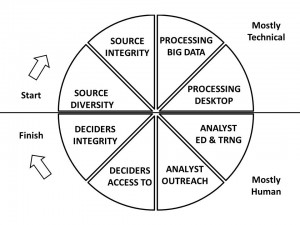
Treason and corruption persist in Washington DC because they are kept secret. There is no better antidote to high crimes and misdemeanors than complete transparency. The problem we have is that across all eight of these functions above we are in the red. We do not have the processing power, the analyst training, the open source access, or even the access to honest deciders, to get it right.
A major obstacle to our creating a Smart Nation, something I wrote about in the 1990’s, is the combination of our fragmentation – heavily influenced by money and secrecy – such that the “eight tribes” of information do not share information (academic, civil society, commerce, government, law enforcement, media, military, non-government/non-profit); and our lack of an open source information sharing and sense-making tool-kit such as Micah Sifry calls for in his brilliant recent book, The Big Disconnect: Why the Internet Hasn’t Fixed Politics (Yet).
Q: In the past, open-source was viewed by some in the intelligence community as less reliable than information gathered through secret means, and has been seen by many as being underutilized. Do you think open-source, which has been utilized in some ways by the intelligence community since at least WWII, is being underutilized or undervalued? What needs to be done to change the mindset here?
A: During WWII the Foreign Broadcast Information Service (FBIS) and its British counterparts did some extraordinary things – understanding that the price of oranges in Paris reflected to a degree our success in bombing railway bridges is one example. What happened after WWII is the total corruption of the secret world. As President Eisenhower warned, secret powers embedded themselves within the US Government and conspired with major corporations – Lockheed Martin prominent among them – to fabricate the Cold War and create a false justification for perpetual war. Open sources are not expensive enough to be attractive to criminals seeking to optimize private profit at public expense. Add to this the growth of secret bureaucracies able to abuse their negative powers – the clandestine service of the CIA for example has forbidden the Open Source Center at the CIA from talking to human sources – I do not make this kind of insanity up – and in DoD open sources are treated as a technical collection opportunity for billable hours, instead of an opportunity for human analysis. Another aspect that interferes with proper leveraging of open sources is that they are by their very nature multi-national and multi-agency in nature – one must bring together bits and pieces from across many boundaries, and make sense in an open multi-cultural manner. The secret world is committed to bi-lateral sharing only, a form of sharing that avoids accountability and is often surprised because it lacks transparency to others who might call into question its false assumptions.
In 2007-2009 I tried to show Jim Clapper, then the Undersecretary of Defense for Intelligence, today the Director of National Intelligence, how an Open Source Agency would set the gold standard for what could be known legally and ethically, with the added advantage that it could be shared. This would in turn call into question the worth of the secret sources and methods that address less than 20% of the totality of the threats and less than 20% of the totality of the policy costs and benefits and less than 20% of the larger global demographic challenges – I was among the first to point out in 2002 that illegal immigration stemmed from very bad foreign and national security policies being bought and paid for by foreign countries bribing our Congress and our two-party cabal.
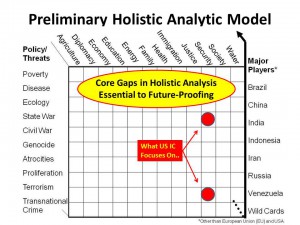
Recently I have realized – and Tom Steyer has realized – that no amount of money or good intention will suffice in any given issue area from intelligence to climate change to defense to health – in the absence of honest government. What needs to change is our government. Matt Taibbi nails it in Griftopia on page 32 when he writes to the merger of political crime and financial crime. The US Government does not represent us. At the strategic level — balancing ends, ways, and means in the public interest — the US Government is dishonest to the bone across the Executive, the Legislature, and the Judiciary.
Q: It's been suggested that collecting open-source data could take more mundane information-gathering off of covert sources and free them up to focus on higher priorities. Do you see this happening?
A: The reality is that most covert collection is worthless and and covert collection does not address the 80% to 90% of our information needs that an Open Source Agency would satisfy. Our highest covert priority is in the counterintelligence arena, against domestic traitors – ideological, religious, and financial. The FBI is a lame organization that goes through the motions and pretends to be useful, when in fact it is worthless at assuring the integrity of our government decision process. From pedophiles to agents of a foreign power to acquisition managers bribed to approve the F-22 and F-35, two of the most worthless dangerous projects in the history of the US Air Force, the FBI is impotent – pathologically impotent – because that is what its political masters want. [NB: I am a HUGE fan of the FBI and want to not only see it succeed at growing its own intelligence division, but see it empowered by an honest president and transpartisan Congress so it can investigate, convict, and incarcerate our domestic traitors — religious, ideological, and financial.]
What I do see happening, if we can mobilize the 100 million eligible voters who did not vote in 2012, is the emergence of a public demand for an Electoral Reform Act of 2015 in time to elect an independent ticket and coalition cabinet in 2016, along with 20-30% of Congress from small parties and independents. This would enable honest governance.
The reality is that we get the government we tolerate. Until the public mobilizes and demands that the government stop selling us out to the 1%, nothing will change. It do feel we are close to a tipping point. Depending on what kind of financial and military and domestic police abuse catastrophes we suffer this fall (September – November 2015), I pray for a mass mobilization that will so frighten Congress it passes the Electoral Reform Act of 2015. Chris Hedges’ book, Wages of Rebellion is interesting, it should be read together with my article in Homeland Security Today, “The Bigger Picture,” as well as the profile of me by Nafeez Ahmed in The Guardian.
Q: Do the skills required to be a good analyst change when you're discussing open-source intelligence versus conventionally gathered (secret) intelligence? Does being able to deal with open-source require a greater range of skills?
A: The secret world has some good analysts, but mostly they are a mix of children hired cheap on the assumption that having access to secrets will make them smart, and retired military who are double-dipping and have not read new books in twenty years. If I were Director of National Intelligence, my all-source analysts would be hired at mid-career and only after demonstrating that they are in the top ten percent of all subject specialists in the open source world – THEN they will be given the privilege of both guiding the collection of secrets, and analyzing those secrets. The secret world is out of control and largely worthless – it is a very expensive way for spending a lot of money to no good end. It desperately needs honest deep leadership focused on outputs (decision support) rather than inputs (spending).
Q: Someone suggested to me that, considering all of the information that is now available publicly, and how much of that information would have once been considered secret, the information out there is actually a bigger “leak” than even the Snowden documents could be considered. Do you think that comparison is valid?
A: Snowden’s biggest revelation was that NSA is doing mass surveillance at great expense and has nothing to show for it. All of the information that is available in all languages and mediums is largely worthless right now because no one does holistic analytics, true cost economics, or open source everything engineering. One could easily say that BOTH the secret intelligence world AND the open source intelligence world are worthless today, the one because it collects 5% and processes less than 1% of what it collects, the other because it processes less than 1% of what is available and lacks any form of analytic integrity. No one in government, banking, corporations, academia, anywhere, gives a shit about getting the right answer in the public’s long-term interest. They are all about profit for the few in the moment.
Q: In “Sailing the Sea of OSINT in the Information Age,” Stephen C. Mercado wrote that some in the intelligence community believe that IMINT is becoming such a widely available commodity that it's in danger of losing its classification as an “INT.” Do you think this view is accurate? And if so, what does that mean for the wider intelligence landscape? As we lose “INTs,” are we also gaining any?
A: Mercado is a camp follower who self-censors, and in consequence he knows nothing of the larger craft of intelligence as it might be applied in the public interest. It is literally stupid to say that Imagery is losing its relevance as an INT. Intelligence is about decision-support, not about secrecy. Mercado’s statement is a perfect depiction of the idiocy that characterizes the secret world and its camp followers.
CrisisMappers is an example of how human, imagery, and signals are being brought together on an open source software platform (Ushahidi) that leverages humans openly trained and in relation with one another, to produce decision-support. I am very impressed by CrisisMappers, what they do for a tiny amount of money is vastly more useful to the public than everything being done by the NRO and NGA on any given geographic challenge.
Q: Do you think the intelligence community is lagging behind in terms of utilization of open-source information?
A: Yes. The US secret world – and by extension all the secret worlds around the world where the US is subsidizing poor practices in return for special access – has lost its integrity in every sense of the world. It lacks a strategy, it lacks sounds policies, its acquisition plans are corrupt and in disarray, and it is largely worthless – a few sound judgments and operations notwithstanding.
In a discussion recently I told a top UK official, now a Lord, that my focus has always been on launching a lifeboat, not sinking the ship. The US secret world is the Titanic and the water has reached the first class compartments. If we do not launch a lifeboat now, a lifeboat called the Open Source Agency, then the US Government – regardless of whether we get an honest government in 2016 – is going to go into the future deaf, dumb, and blind.
The Open Source Agency would fund the United Nations Open-Source Decision-Support Information Network (UNODIN) incuding a Multinational Decision Support Centre and global multinational information-sharing and sense-making network; a World Brain Institute, a School of Future-Oriented Hybrid Governance, a global campaign to document and make freely available the true costs of every product, service, policy, and behavior; and a Global Game allowing every person to play themselves – armed with true cost information – on every issue they care about.
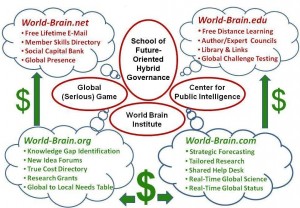
As I have briefed in my invited UN White Paper, my keynote presentation to the Ecuadorean intelligence community, and my most recent article for Europe on “Applied Collective Intelligence,” we are at a tipping point. It is now possible for the 99% to self-govern and govern wisely, and to make this transition without vindictive justice. I am huge on “Truth & Reconciliation.” All we need is for the 1% to get out of the way – from Lady Lynn Rothschild and her concept of “Inclusive Capitalism” to the Black Sheep Billionaires of Silicon Valley talking about “Redemptive Capitalism” to the Mars Family of Virginia and their long-standing concept of “Mutuality Economics,” I am seeing great hope. Open Source Everything is about creating a prosperous world at peace, a world that works for all.
Q: You've literally written the book(s) on OSINT. What changes in the collection and analysis of open-source data have you seen over the past several decades? Have we gotten better at utilizing the open-source material and methods available, or as more data has become available, have we gotten worse at being able to collect and analyze the useful tidbits?
A: On the one hand I have seen some really superior advances in individual methods. Arnold Reuser, for example, the founding head of the Dutch military intelligence OSINT unit; today retired and a consultant and trainer, has devised some truly superior methods for getting to exactly the right documents buried within the garbage pile that a standard search engine might present. On the other hand I have seen severe retrogrades, and two jump to mind. First, Google is largely crap – they index 2% of what is online and manipulate the search results to suit those who pay them. Second, DIALOG no longer offers the RANK command which in its time allowed us to rapidly identify the top authors by both frequency of publication and frequency of citation by others, something Mary Ellen Bates used to very good effect to help me in 2007 when I sought to identify the best minds writing about each of the ten high-level threats to humanity and each of the core policy areas and each of the major demographics. I am sorry to say that on balance I believe we have wasted a quarter century of time and close to $1.25 trillion dollars in the US secret world alone, for lack of integrity and lack of interest in advancing the craft of intelligence as a provider of holistic decision-support.
Q: You've suggested before that US intelligence practices often aggravate rather than ameliorate the bigger threats and challenges. Can you talk a bit about what you mean?
A: I suppose you are referring to my disdain for regime change, support for dictators, the drone assassination program with a 98% collateral damage ratio, our persistent sponsorship of black prison sites, rendition, and torture; and our tolerance if not active enabling of drug money, arms smuggling, and money laundering as standard practices. In my view the US intelligence community should be focused on decision-support. Covert actions – paramilitary operations, media influence operations (funding lies), and agent of influence operations (funding treason within other countries) should not be part of our standard practices. What is done in our name and at our expense every single day easily includes crimes against humanity and misbehavior that in any properly run country would subject the President and some of his (or her) Cabinet officials to impeachment proceedings as well as demands for an accounting to an International Tribunal. I believe that we need to stop selling arms – and subsidizing fossil fuels – as part of our national foreign policy. Ron Paul has it right when he calls for a foreign policy of peace and commerce – anything less is a betrayal of the public trust.
What troubles me most about the last 25 years is that intelligence has not been part of creating a wiser smarter nation able to make the transition from the 20th Century era of elective wars, predatory capitalism, and virtual colonialism, to a 21st Century era of sustainable co-prosperity. I see the solutions so clearly, all of them rooted in transparency, truth, and trust – along with public education – it just breaks my heart that not a single leader today has the integrity to speak the truth to the public and embrace these obvious – these stunningly startlingly obvious – sources and methods for public intelligence in the public interest.
Q: Since at least 2000, for the past fifteen years, you have advocated for the creation of an Open Source Agency to aid the intelligence community. How do you think such an agency would benefit US intelligence? And do you think such an agency will ever be created — and embraced — by the intelligence community?
A: The OSA was first called for in an article in Studies in Intelligence, the CIA’s internal journal, in 1969. It was the Science & Technology analysts who most understood that we were missing a major portion of the relevant information in our obsession with stealing secrets while ignoring open sources. In the 1970’s Jan Herring led a push to better access and exploit open sources. I picked up the baton in the 1980’s after I co-led the creation of the Marine Corps Intelligence Activity and discovered that the secret world had nothing to offer on Burundi, Haiti, Somalia, and other Third World hot spots as well as the emerging threats. From 1989, when I ghost-wrote “Global Intelligence Challenges in the 1990’s” for General Al Gray, then Commandant of the Marine Corps, and then my own 1990 article, “Intelligence in the 1990’s: Recasting National Security in a Changing World,” I have been trying to get the US Government – and 65 other governments – to understand that we need to get a grip on all information in all languages all the time – and that we must share the burden of making sense of all this information. Here below are the six challenges I identified in 1990, not a single one of which has been properly addressed by the US secret world in the 25 years since I pointed these out as essential.

We will have an Open Source Agency when We the People demand an honest government and we have the combination of an independent presidency not beholden to those who own the current two-party tyranny, and an independent Congress that lives up to its Article 1 responsibilities. I feel in some ways as Fidel Castro must have felt 50 years ago when he said Cuba and the US would reconcile when there was a Pope from South America and a black president. I hope I do not have to wait for a Muslim Pope and a Native American president. I do believe I will see this in my lifetime, but it would go much faster if our billionaires would realize that a 100% corrupt government is not working and they need to stop paying for all this corruption.
Q: You've said that “Most of what is produced through secret methods is not actually intelligence at all. It is simply secret information that is, most of the time, rather generic and therefore not actually very useful for making critical decisions at a government level.” Why do you think this is so? Do you think open-source information is or can be more accurate and helpful? And how can intelligence agents get better information out of these sources, whether open or covert?
A: I cannot over-state this: intelligence is about decision-support, the outputs; it is not about secret sources and methods, the inputs. Today what we call intelligence is an accounting cesspool that joins the agricultural, banking, defense, energy, and health cesspools, where government is nothing more than a means of transferring wealth from the individual taxpayer – the 99% — to the special interest elites – the 1%.
It is established beyond argument that NSA processes less than 1% of what it collects. It is established, beyond argument, that most of what CIA claims to have collected via clandestine human intelligence means is in fact a mix of hand-outs from foreign intelligence services, and debriefings of legal travelers here in the USA. In 2002 I published my second book with 26 “new rules for the new craft of intelligence.” One of those rules, illustrated below, called for new balance. We do too much technical collection and not enough human collection (both secret and open). We don’t process anything at all. We obsess on a few secrets and ignore the 90% that is not secret. Finally, we keep our analysts occupied churning out the equivalent of classified news rather than deep reflections on how everything is connected and where we can make cost-effective interventions that create a prosperous world at peace. Nothing of substance has changed in 25 years – we simply spend much much more money.
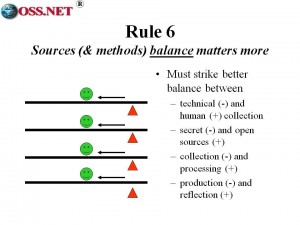
Here below I offer just one graphic created by the 24 people that came together under the auspices of Earth Intelligence Network. This is what a public intelligence ecology might look like – so very easy to create, provided one can find leaders actually committed to the public interest.
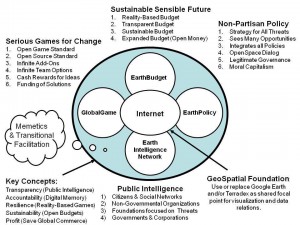
Here is a common sense graphic from Medard Gabel, co-creator with Buckminster Fuller of the analog World Game, and a member of our Earth Intelligence team. The insanity of our prevailing government policies and budgets could not be more graphically illuminated.
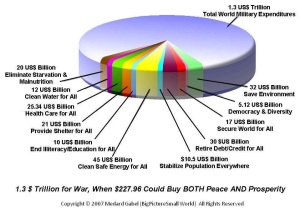
Why do we spend so much on war and waste instead of peace and prosperity? Because war and waste are profitable for the few and our government has allowed itself to be bought by those few. The purpose of an Open Source Agency is to educate and empower the public such that common sense is a common virtue, and intelligence with integrity the signal characteristic of our government.
RELATED OR ANOTHER STORY: ELECTORAL REFORM




